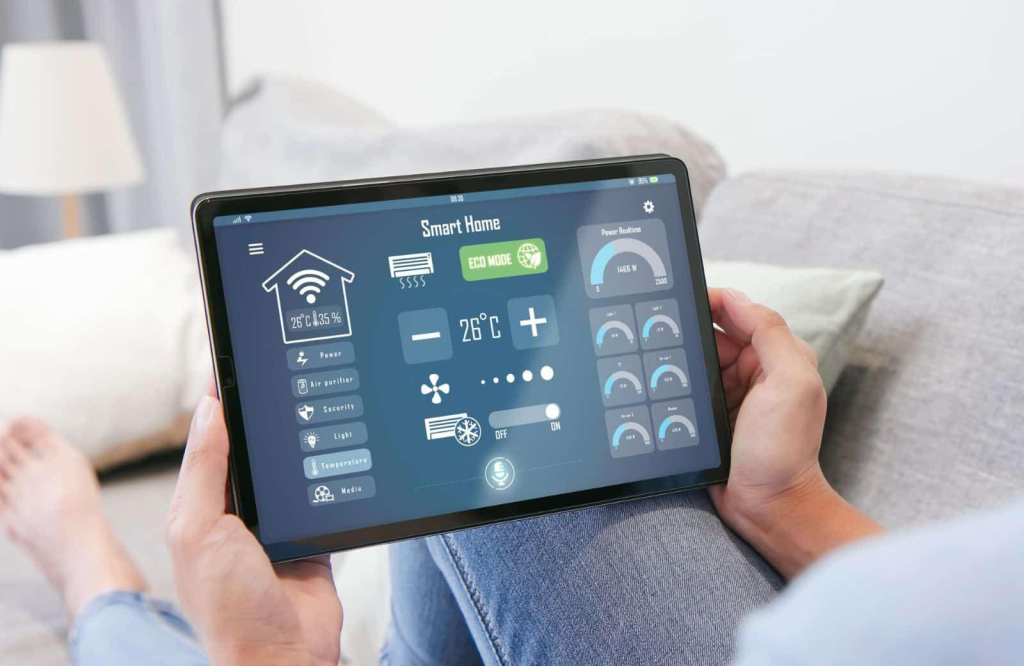Great Benefits of Smart Home Devices

Smart home technology is making our homes and offices more convenient and productive. These devices are controlling from lighting with a simple voice command to remotely monitoring home security, smart devices offer an abundance of benefits. These devices are critical due to various reasons like time and energy consumption. In this exhaustive guide, we will examine the numerous advantages of smart home devices and explain why investing in them can make your life easier, more comfortable, and even greener.
What is Smart Home Technology?
A unified network of devices, appliances, and systems that may operate autonomously and remotely is called “smart home technology”. A “connected home” integrates multiple home technologies into a single system for automation purposes. A unified system connects thermostats, lighting systems, audio speakers, TVs, security cameras, locks, and appliances. This technology is easy to manage with a smartphone or touchscreen.
The use of smart home automation enables individuals to access advanced technological features and luxurious amenities that were previously unattainable. The ongoing expansion of technology development will correspondingly broaden the potential for consumer home automation, enhancing convenience and enjoyment in daily life.
Benefits of Smart Home Devices:
Smart home devices despite their drawbacks are still the most adapted innovations in many regions. Early adopters are getting a lot of benefits from these. Some of the general benefits of smart home devices are given below.
The Convenience Element
Home automation aims to make life more convenient and comfortable. Just imagine entering your home and commanding the lights, thermostat, and your favorite music to work in harmony with your preferences, all with just a single voice command. These devices streamline your daily tasks, making your life more efficient and enjoyable.
Energy Efficiency
One notable advantage of smart home devices is their capacity to contribute to energy conservation. Intelligent heating systems, such as smart heaters, possess the capability to acquire knowledge about an individual’s preferred temperature and then adjust themselves accordingly to maintain that specific level. This has the potential to conserve energy and reduce expenditures associated with power consumption significantly. Intelligent lighting systems provide the capability to deactivate lighting fixtures in areas that are not currently occupied, thereby yielding further energy conservation benefits.
Enhanced safeguarding measures
Smart cameras have become a crucial component of contemporary residential security systems. These advanced technological systems are equipped with capabilities such as motion detection, facial recognition, and night vision, enabling comprehensive surveillance of an individual’s property. These devices enable individuals to remotely monitor their residences from any location worldwide by delivering live video to their smartphones.
The Smart Kitchen Revolution

The Internet of Things (IoT) is having a big impact on the kitchen. The advent of intelligent kitchen equipment has revolutionized the culinary landscape, altering how we prepare meals, consume food, and oversee our dietary provisions. These cutting-edge technologies include refrigerators that produce grocery lists and remote-controlled stoves.
These gadgets provide a variety of advantages, such as the reduction of food waste, the improvement of cooking accuracy, and the streamlining of meal preparation. Through the utilization of voice commands and smartphone applications, individuals can effortlessly manipulate their kitchen appliances. In addition, several intelligent kitchen appliances are capable of establishing connections with extensive recipe databases, thereby offering users cooking suggestions and valuable tips.
Personalization and Customization
The versatility of smart home gadgets is a notable advantage. One can tailor and individualize them to align with one’s tastes optimally. These gadgets have the ability to adapt to individuals by establishing distinct routines for certain periods of the day or modifying device settings to align with their lifestyles.
The Entertainment Hub
The integration of smart home gadgets has the potential to convert one’s living room into a multifunctional entertainment center. The integration of smart TVs, streaming gadgets, and sound systems can be achieved with seamless connectivity. The ability to manipulate many aspects of one’s environment through vocal commands or smartphone applications enables the creation of an immersive cinematic ambiance within the confines of one’s residence.
The Environmental Advantages
The importance of adopting eco-friendly practices has become increasingly significant in contemporary times. In this regard, the utilization of smart home devices has emerged as a potential avenue for mitigating one’s environmental impact. Through the process of energy optimization, these gadgets make a significant contribution towards fostering a more sustainable way of living. Certain technologies can offer valuable information regarding energy consumption, thereby assisting individuals in making more environmentally conscious decisions.
Pros and Cons of Smart Home Devices

Smart home devices offer various benefits and come with some drawbacks. Here are the pros and cons of using smart home devices:
Pros:
- Convenience: Smart devices make daily tasks easier by automating functions like lighting, heating, and security.
- Energy Efficiency: They can help reduce energy consumption through optimized control of appliances and lighting.
- Security: Smart cameras and alarms enhance home security and provide remote monitoring.
- Remote Control: You can control your devices remotely using a smartphone or voice commands.
- Integration: Many smart devices can work together, creating a cohesive ecosystem.
- Customization: They allow for personalized settings and schedules.
Cons:
- Cost: Smart devices can be expensive to purchase and install.
- Privacy Concerns: Data collected by these devices can raise privacy issues.
- Complexity: Setting up and troubleshooting smart devices may require technical expertise.
- Compatibility: Some devices may not work together, leading to interoperability issues.
- Dependency on Connectivity: They rely on a stable internet connection, which can be problematic during outages.
- Security Risks: Vulnerabilities in smart devices can be exploited by hackers.
It’s essential to weigh these pros and cons to determine if smart home devices are the right choice for your specific needs and preferences.
Conclusion
The advantages of smart home gadgets are manifold and extensive. These products provide exceptional levels of convenience, energy efficiency, improved security, and a sense of tranquility. Given their capacity for remote house management and the potential for financial efficiency, smart home technologies represent a prudent investment for forthcoming endeavors. In addition, the available customization possibilities render these products appropriate for a wide range of lifestyles. The advent of smart technology has exerted a substantial influence on all facets of human existence, encompassing the enhancement of health and safety protocols.




